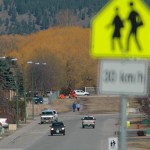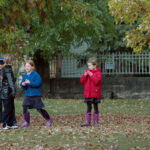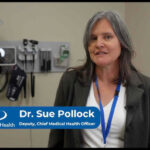Home »

Invermere mayoral candidates on display; Area G too
District of Invermere voters were given an up-close view of their mayoral candidates Nov. 10 during a Columbia Valley Chamber of Commerce candidates’ forum at the chamber’s crossroads centre.

Incumbent Gerry Taft and challenger, Coun. Al Miller, outlined their platforms and positions based on opening and closing statements and answers to selected questions, handled by emcee Richard Haworth.
In addition, the chamber afforded a stage to Regional District of East Kootenay (RDEK) Electoral Area G candidates, incumbent Gerry Wilkie and challenger Roberta Hall.
Electoral Area F director Wendy Booth, acclaimed, will be representing her area for a second term. In attendance, she noted she is enjoying not having to run a campaign and is looking forward to getting back to work.
Taft led the evening off by stating he has the experience that Invermere needs moving forward, citing six years on council before serving his first term as district mayor, including as its representative with the RDEK and Kootenay East Regional Hospital District.
“I feel that I have been effective,” Taft said, noting the improvements to the Invermere and District Hospital’s emergency room and the recently announced improvements to the hospital heli-pad as two more recent examples.
“I’m aware of what is realistic for local government,” said the owner of Gerry’s Gelati, a downtown hot spot.
“I’ve been open and accessible and I make time for the job. I am motivated to do what is right for the whole community,” he said, adding he is always open to looking at new ideas.
“The realities out there today are pretty harsh,” Taft said, pointing out that as mayor he’s been able to keep Invermere’s taxation relatively stable. “We need to set realistic goals,” he said, noting that stable taxation can lead to challenges.
“A one per cent tax increase for the District of Invermere only produces $30,000,” he said.

Miller, the owner of Invermere Home Hardware, located at the crossroads of the Athalmer Highway and Highway 93/95, opened by thanking Canada’s veterans “for making this all possible.”
Miller highlighted his forays into volunteerism in the community, including the chamber of commerce, since he arrived in 1988.
“You better be committed to your community – to the valley – and I have been,” he said, speaking from a venue he shares the responsibility for establishing.
“We moved from location to location until we could get our foot in the door. We decided we (chamber of commerce) needed a new home and what did we do? We collaborated and we built. Back then the chamber didn’t have one red cent to its name,” he said, citing an example of what can be done when there isn’t much to start with.
Miller concluded his opening statement by suggesting Invermere can dare to dream.
“A theatre – let’s dream big. I think we can do it,” he said.
Roberta Hall (pictured above) then had the floor and she admitted to the full-house that “I’m energetic and enthusiastic.”
Born and raised in the valley, she said she has seen many changes – “some awesome and some not so great.”
Hall said the valley community needs to “celebrate our milestones and our challenges.”

Wilkie, finishing his first term with the RDEK board, said he remains committed to his community and the region.
“I feel very deeply about the area I live in,” he said, adding he’s “learned quite a bit about the way the regional district works.”
Wilkie said he’d appreciate another chance at representing Area G.
“Boy oh boy, there are a lot of things in the works right now and I’d like another chance to complete them.”
One of the things Wilkie is working on is an agriculture plan in the East Kootenay, calling agriculture the “sleeping economic giant of the future.”
The economy was the focus of the first question asked the candidates: what one thing would they do to stimulate job growth?
Miller said job growth is “very, very important.”
A way to enable job creation and growth is to let businesses do their thing without government interference.
“We have to make business peoples’ lives easier. Let’s stand behind our business community and give them what they need. We haven’t done a good job bringing our business community in and making them involved,” he said.
Taft said there are a couple of things the municipality can do to help businesses, including supporting the White Way (along Lake Windermere) and replacing the crossroads Invermere sign, as well as continue with allowing beach amenities and ensure the running of a Panorama (Mountain Resort) shuttle. Those are “short term” things that can be done, he said.
“Long term – businesses are what create jobs and not government,” he said, cautioning that municipal governments must be wary of business needs, too.
“I’m a bit leery about giving businesses what they want” because it could cost the town money. “Money doesn’t come out of thin air.”
Taft said the decisions made by Invermere council today may not be felt for “ten – 20 or 20 years from now” and as a result wisdom must prevail at the council table.
Wilkie said Area G is “comparatively pastoral” up against Invermere.
From my perspective, to provide the best possible use of land use decisions” and following the official community plan will provide the safest route forward for the economy.
Hall said she agreed with Taft and Miller.
“As elected officials, it’s not our job” to grow jobs or the economy, but it is an elected official’s job to facilitate what they can.
“As a business owner in the valley I’ve seen a few things that can really be improved,” she said, adding that by shopping locally, residents help each other out.
“We need to support each other,” she said.
The second question posed the candidates was: if elected what will be your primary goal for the first year in office.
Taft said a new Invermere sign would be doable and noted that he would have to help bring his new council up to speed, noting there will be at least two new councilors following the Nov. 19 election, with Bob Campsall not seeking re-election and Miller running for mayor.
“It really does take time when you have a new council,” he said.
Miller said he’d “start the whole communication – big time” and “start going after those relationships with our provincial and federal governments and try and repair the relationships that may have been damaged in the past.”
Hall said she expected the first couple of years “would be a huge learning curve” but she’d focus on strong communication, so we are all on the same page.”
Wilkie said he knows his way through the RDEK channels now.
“Based on my understanding of the abilities provided through the regional district, I will really go to bat for the people,” he said, adding he also “really wants to work on establishing a community forest.”
Collaboration was the theme of the next question, as in what could the candidates do in terms of collaborating with outside agencies to make something happen in their bailiwick.
Miller said he believes an economic development officer would be such a project requiring collaboration.
“I would suggest the area would be ripe for it,” he said, adding the district can work with College of the Rockies to help it find more space.
“Collaborative thinking and partnering – that’s how the job gets done,” he concluded, mentioning a library/theatre project could and should be re-visited.
“I view regional collaboration as the most important issue facing all of us,” Taft replied.
“Some of these big ticket items” are costly, he said and collaboration would help the district in many ways.
“But our best bet is to build on the easy ones (projects) – the low hanging fruit first. It will take time and take breaking down some barriers,” he said, adding he believes parochialism is waning in the region.
“We are coming together. But we have to work at a reasonable pace,” he said, noting he isn’t “convinced” that an economic development officer is required.
Wilkie pointed at the Wings Over the Rockies bird festival as a great example of regional collaboration.
“Fifteen years ago a group got together and talked about the need to build our shoulder season,” and Wings came about, Wilkie said. “That first year we put a lot into it,” he said, adding “volunteer strength” has been vital to Wings’ success.
‘The cumulative impacts of small things can be very significant,” he said.
Hall agreed with Taft, noting she isn’t sure an economic development officer is needed.
“I think we need an economic plan first,” she said.
How the candidates would help improve the tourism industry was the final question posed.
Taft said he sees Invermere and the valley as being often confused by outsiders as a tourist town.
“Quite frankly we are a second home valley. We are actually declining in tourism,” he said, suggesting one thing the district can do to help tourism is “stay firm on maintaining hotel rooms” and zoning accordingly.
“We need to talk about the employment situation,” he said, pointing out the continued need for staff housing and the retention of seasonal staff.
Tourism “benefits everyone one of us who lives in this valley,” Miller said, agreeing with Taft that the second home market rules. However, he added that tourism marketing needs enhancing.
“We have to see what the needs are and run with it,” he said, adding the “lake experience” can be enhanced, especially in winter.
Hall said it is not up to elected officials to improve tourism.
“Let’s be really clear whose job that would be,” she warned. However, politicians can work collaboratively with industry.
“On the marketing side – creating a vibe,” she said, “we need to figure out what that vibe might be.”
Wilkie agreed with her.
“We can only provide direction,” he said, adding that valley residents need to come to terms with tourism.
“We have to come to grips with our proximity to the City of Calgary,” he said, adding he supports recreational tourism ideas as opposed to “industrial tourism.”
The candidates then had a few minutes to make closing remarks.
Taft said a vote for him would be a vote looking “to actions over words. I’ve never been afraid to vote with my convictions.”
He then took umbrage to Miller’s earlier suggestion that the district has damaged relationships with senior levels of government.
“I don’t believe there are damaged relationships,” he said, adding he doesn’t have use for “back room deals and secret letters.”
The district must remain “realistic,” Taft said, noting he believes in dreaming big but not at the expense of taxpayers. “Putting good dollars after bad dollars doesn’t do anybody any good,” he said.
Miller said a mayor and his/her council must focus on “a sustainable budget” while dealing with infrastructure needs of the municipality – “in line, on budget and moving forward.”
District services, such as Invermere Fire-Rescue must be supported at every turn, he added.
“They put a lot of volunteer time in and we have to back them up,” Miller said.
There is nothing wrong with dreaming big, he continued, noting he’s not suggesting the district going into further debt to do so.
Getting groups organized to take on projects, supported by the district, is the way to go.
“I’m not talking financial. There is a lot brain energy” in the valley and many people with money “who have a passion for the valley. There is always a way. We just have to be positive and hopefully some of my past has proven my track record,” he concluded.
Hall closed by noting togetherness occurs with people when a crisis is occurring.
“Maybe we are going to become united,” she suggested, due to the current, lingering economic situation around the globe.
“Nothing stays the same. We have to be open to new ideas and enhancing what we have for the future,” she said.
Wilkie said agreed with Hall’s “eloquent” words.
“The important things we have for looking toward the future are the values we have,” he said. “It’s based on respect for each other and respect for the land. If we work on that basis, we have nothing to fear.”
Moving forward, Wilkie said, “We need to things on a valley-wide basis.”
Ian Cobb/e-KNOW
Carrie Schafer/Through My Eyes Photography images







